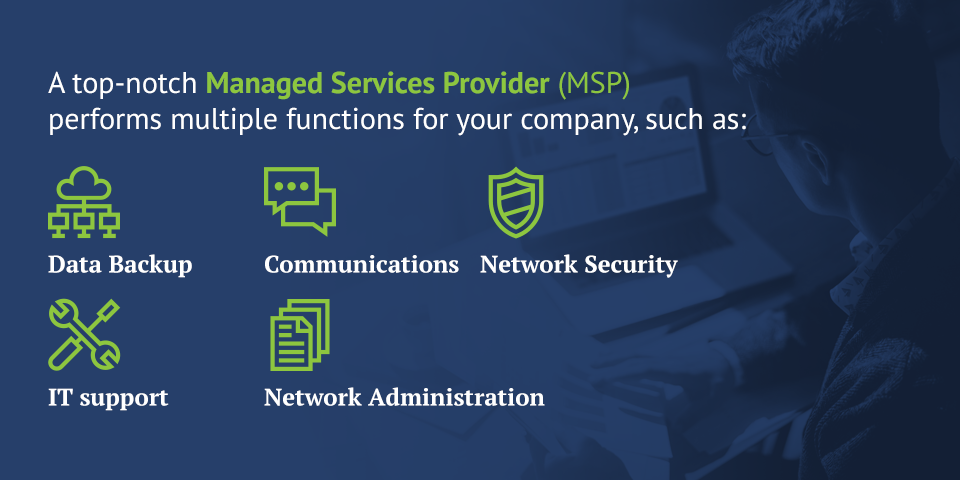What Are the Benefits of Managed Services?
Technology makes modern-day business possible by increasing efficiency and generating useful insights through data. Your networks house your information and make it possible to get more work done than ever before. As one of your most valuable assets, your network deserves the utmost care and attention when it comes to upkeep.
Many businesses assume that the only option for network management is to delegate it to the in-house IT team, but that’s far from the truth. Managed IT and technology services provide expert support and service for your network, so you can focus on what your business does best. The business benefits of managed services, in combination with the money you can save, make it a smart solution for companies of any size.
What Are Managed Services?
Every business uses technology as a means to compete in their field and maximize efficiency. Businesses rely on networks and IT more than ever, and the funds needed to maintain an in-house team keep rising. For many small businesses, this often means sacrificing the quantity or quality of network maintenance efforts to conserve limited resources.
Managed services are a way to outsource maintenance and repairs to experts. A top-notch managed services provider (MSP) performs multiple functions for your company, such as:
- Network Administration
- Data Backup
- Network Security
- Communications
- IT Support
These services take the pressure off your internal IT team, freeing them up to assist your employees and perform daily tasks with better efficiency and focus.
What Are Break-Fix Services?
Break-fix services ruled the market for decades. When businesses experienced a problem with a server, they would call up an IT expert and try to explain the issue. If they were lucky, a solution could be found quickly. If they weren’t, they would be stuck with expensive repairs and downtime. This type of reactive service is known as the break-fix approach.
Managed services, on the other hand, offer constant and consistent monitoring of your systems with the goal of preventing failures wherever possible. Remote monitoring means your service provider can always see what’s going on and fix it directly.
What Are the Benefits of Managed Services vs. Break-Fix Services?
The pros and cons of managed services make it clear that partnering with an MSP is the best way to simplify your IT management affordably. These are the top 10 financial and business benefits of managed services.
1. Predictable Low Cost
Can managed services cut down cost? The answer is yes. It can also make your IT expenses more predictable. With managed services, your costs are neatly packaged into a set amount paid on an annual or monthly basis. An in-house IT team, on the other hand, comes with many more frequent and unexpected expenses that can quickly drain your budget.
Networks come with a lot of equipment that needs to be maintained and sometimes repaired or replaced. MSPs provide maintenance as well as repairs as part of the contract, so a fix that might cost you thousands of dollars out of pocket is absorbed by the provider. This model shields your budget from extreme fluctuation, improving the stability of your business overall.
Small businesses benefit immensely from managed services because the up-front cost to start is so much lower. When a business starts from scratch, the initial costs of hiring and training a team while simultaneously paying for the servers and other equipment necessary can be financially overwhelming.
2. Scalability
The price tag associated with maintaining an in-house IT team is a big one, and that’s why you often see teams that are understaffed, overworked and unable to get everything done due to a lack of time and resources. That doesn’t work on a daily basis, and it definitely doesn’t fly when your company is trying to expand.
Training even one additional employee for your IT department costs thousands of dollars, and there is never a guarantee that they’ll even stay with the company. An MSP absorbs the cost of training, and you’ll never have to worry about your IT experts jumping ship.
Scaling networks takes significant coordination, manpower and new equipment. It’s a huge cost for any company, and it often takes an IT team’s focus off other important functions like security. Managed services can help you expand or upgrade systems when you need to, without having to hire and train employees you won’t necessarily need later on.
MSPs help your business stay flexible when it comes to resources and can accommodate swift changes an in-house team might not be able to respond to efficiently.
3. Minimized Downtime
Downtime most often crops up due to equipment issues. Servers can fail, and computers can malfunction. Electrical disruptions can occur as well. These issues are usually mitigated by implementing redundant equipment that allows systems to switch to a backup when there is a failure.
Unintentional human error accounts for a significant chunk of downtime, and there’s not much you can do to avoid it. Employing strong safeguards in critical systems is the best way to reduce the potential risk.
System attacks can also take out your networks and data. Small businesses are particularly vulnerable to cybercrime. Up to two-thirds of attacks are targeted at small businesses, and small businesses are the least likely to have protections in place that would minimize downtime in the event of a cyberattack.
Reducing the risk of downtime is a multi-faceted task that an in-house team may not have the bandwidth or experience to tackle effectively. Managed services can cut down costs associated with downtime by preventing it from happening in the first place.
4. A Preventive Approach
When something breaks, you fix it. With networks and data, however, the cost of repairs can put a big dent in your company’s budget. Depending on the size of your business, the cost of a security breach can run into the millions of dollars.
Rather than rushing to call in experts after a disaster has occurred, it’s smarter to take a preventive approach by partnering with a managed services provider. They monitor your systems for problems and can resolve issues before they transform into full-fledged catastrophes. The cost savings associated with this approach are one of the top reasons to use managed services.
5. Proven Experts
Hiring an IT team is expensive and time-consuming, and you can’t know for sure how good they are until they’re faced with a serious network issue. Some may pass the test with flying colors. Others may not be able to resolve the problem in a timely manner or at all, costing your company money you can’t afford to waste.
Even when your IT staff is competent and comfortable with your systems, you may find they are not well-equipped to operate or maintain new equipment and systems as you add them. The most common issue is that even the most well-trained employees don’t have the knowledge and experience of an MSP’s large team.
An MSP can provide specialized services to fill in any gaps in your team’s expertise. It doesn’t make sense to have an employee learn a whole new skill set for a one-time project. An MSP gives you access to a team of experts with precise skills you wouldn’t have access to otherwise.
6. Narrowed Business Focus
What are the advantages of managed services for your IT team? An MSP frees up your IT team for pursuits that are more crucial to your business. The common perception of IT professionals envisions them performing menial repairs and asking whether you’ve turned it off and on again. While this is true in some businesses, it’s definitely an ineffective use of IT resources.
If your internal team is swamped with helping users fix basic issues or dealing with equipment malfunctions, they don’t have the time or focus to work on projects that push your business forward.
Managed services can help by redesigning workflows, upgrading equipment and automating certain tasks. This takes the pressure of daily processes off your team so they can focus on innovation.
7. Data Compliance
Your company’s data is subject to a litany of regulations designed to keep information secure. Your team has to sift through the hundreds of current standards and regulations and figure out which ones apply to your company. They also have to ensure every one of those applicable rules is followed to the letter, all while performing their day-to-day work.
The Payment Card Industry Data Security Standard (PCI DSS) and Health Insurance Portability and Accountability Act (HIPAA) are the most widely applicable standards businesses have to meet. The consequences for violating these and other standards are hefty fines and reputation damage that some businesses might not be able to overcome.
A managed services provider handles the complexities of compliance and auditing, so you don’t have to worry about violating data security regulations. They can also run reports and conduct audits that prove your organization is meeting all requirements. This can save your in-house team thousands of hours in the long run.
8. Reliable Relationships
The ongoing relationship with an MSP has several benefits. Managed services act as a partner for your in-house team and a bridge between you and technology vendors. They serve as a single point of contact for your business and become familiar with your company over time.
A trustworthy MSP is a valuable partner in helping your business grow, not just a service you call when something breaks. They have a vested interest in keeping your networks and systems healthy and delivering insights you can use to help your bottom line.
9. 24/7 Support
Managed IT services use remote monitoring technology to keep an eye on your systems day and night. Real-time alerts mean any problems that occur can be corrected before they have a noticeable impact on your business.
Without constant monitoring, it’s easy for a network issue to happen during off-hours. If a system goes down in the middle of the night, it might take some time before anyone finds out. In some cases, the problem isn’t discovered until the next day — after significant damage has already been done. Remote monitoring allows your MSP to take instant corrective action as soon as they receive an alert.
Working with an MSP can also give your company professional cybersecurity support. MSPs can improve your cybersecurity efforts in a few key ways:
- Updated security standards: MSPs can implement security strategies that will keep your business protected from data loss, hacking and other hazards.
- Cyberattack prevention: These protections monitor for security threats to prevent them from becoming malicious attacks.
- Rapid response: If a security incident occurs, the MSP will assess the challenge and determine the best course of action to lessen the damage.
- Regulatory compliance: An MSP with PCI compliance can reduce risks related to sensitive information breaches, like credit card use and client data.
10. New Technology
Technology itself is one of the biggest costs in IT. There’s always an equipment upgrade to be had, and it can be tough to discern which ones are right for your business. There are few things more frustrating than investing in new network infrastructure only to find it doesn’t meet your needs — or your team doesn’t know how to operate it correctly.
One of the major benefits of using managed services is the constant access to up-to-date technology. You’ll never have to worry about your systems being outdated or making an investment that doesn’t pan out. The cost of system upgrades is rolled right into your MSP fee.
11. Reduced Risk
Every business faces risks due to government regulations, financial conditions, market conditions and evolving technologies. Many companies have to comply with privacy laws and regulations from PCI DSS, ISO and other organizations. In addition, a successful cyberattack could cause financial and reputational damage to your business, causing you to lose profits and customers.
Using an MSP for your IT services can help your business mitigate some of these risks and protect your assets. MSPs understand the security challenges and regulations of your industry and can help you meet them. Their expertise can help you keep up with changing regulations while having a reliable defense against security issues.
Managed IT services are proactive, meaning you can also reduce your risk of becoming the victim of a breach. Your MSP can identify vulnerabilities and put the appropriate defenses in place to mitigate them. A secure system can build your trust with customers, encouraging them to do business with you.
12. Focused Energy
Managed services for IT make it easier to do your job. You can trust your MSP to provide the knowledge and expertise necessary to improve your security while you focus on your core business efforts and goals. If you have in-house IT professionals, an MSP can assist with day-to-day tasks and projects like:
- Cloud computing.
- End-user support.
- Disaster recovery planning.
- Data center solutions.
- Cybersecurity management.
- Asset and computer systems management.
With a break-fix system, an IT problem could keep you from continuing your daily tasks. Diagnosing and fixing problems in the moment takes additional time away from your work. In this way, regular IT issues can prevent you from growing your business. An MSP identifies potential issues early on, saving time and allowing your team to focus its energy on your business instead of technical difficulties.
Choosing the Right Managed Services Provider
Like any service, outsourcing management only works if you select the right partner. Consider these factors when you’re deciding which MSP is right for your company:
- Defined Service Level Agreements: Businesses come in all shapes and sizes. Service level agreements should, too. A good MSP will have flexible options to ensure compliance and timely response times. A clearly-defined service level agreement benefits both parties by setting airtight expectations from the start.
- Experience in Your Industry: Look for a managed services provider that knows your field. Keeping up with regulatory requirements takes experience, and a track record of previous success is a good indicator that they have what it takes to successfully maintain your network.
- Commitment to Growth: Why use managed services if they’re not focused on the future? Look for an innovative approach and a willingness to take on new challenges and new technology.
- Exceptional Customer Service: Customer service is non-negotiable when it comes to selecting an MSP. These are the people you’ll be talking to if something goes wrong, so honesty and friendliness can be a defining feature. The right services provider has a dedicated team ready to anticipate your needs, going above and beyond every time.
Why Managed Services at Morefield
Managed services are a cost-effective way for small and medium-sized businesses to increase competitiveness. They allow you to benefit from the same quality of equipment, level of experience and support as you’d find in much larger corporations.
With over 70 years of technological experience and a passion for world-class service, Morefield Communications is your source for the best in system management. We use the latest and greatest technology to monitor your servers, routers, firewalls, workstations and more. Contact Morefield today to learn how our managed services take the headache out of IT and get the greatest ROI out of your network.




